LETTER OF HIS HOLINESS POPE FRANCIS TO THE PEOPLE OF GOD
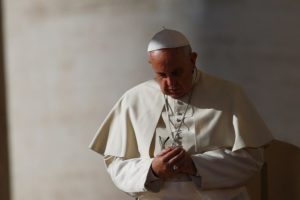 “If one member suffers, all suffer together with it” (1 Cor 12:26). These words of Saint Paul forcefully echo in my heart as I acknowledge once more the suffering endured by many minors due to sexual abuse, the abuse of power and the abuse of conscience perpetrated by a significant number of clerics and consecrated persons. Crimes that inflict deep wounds of pain and powerlessness, primarily among the victims, but also in their family members and in the larger community of believers and nonbelievers alike. Looking back to the past, no effort to beg pardon and to seek to repair the harm done will ever be sufficient. Looking ahead to the future, no effort must be spared to create a culture able to prevent such situations from happening, but also to prevent the possibility of their being covered up and perpetuated. The pain of the victims and their families is also our pain, and so it is urgent that we once more reaffirm our commitment to ensure the protection of minors and of vulnerable adults.
“If one member suffers, all suffer together with it” (1 Cor 12:26). These words of Saint Paul forcefully echo in my heart as I acknowledge once more the suffering endured by many minors due to sexual abuse, the abuse of power and the abuse of conscience perpetrated by a significant number of clerics and consecrated persons. Crimes that inflict deep wounds of pain and powerlessness, primarily among the victims, but also in their family members and in the larger community of believers and nonbelievers alike. Looking back to the past, no effort to beg pardon and to seek to repair the harm done will ever be sufficient. Looking ahead to the future, no effort must be spared to create a culture able to prevent such situations from happening, but also to prevent the possibility of their being covered up and perpetuated. The pain of the victims and their families is also our pain, and so it is urgent that we once more reaffirm our commitment to ensure the protection of minors and of vulnerable adults.
1. If one member suffers…
In recent days, a report was made public which detailed the experiences of at least a thousand survivors, victims of sexual abuse, the abuse of power and of conscience at the hands of priests over a period of approximately seventy years. Even though it can be said that most of these cases belong to the past, nonetheless as time goes on we have come to know the pain of many of the victims. We have realized that these wounds never disappear and that they require us forcefully to condemn these atrocities and join forces in uprooting this culture of death; these wounds never go away. The heart-wrenching pain of these victims, which cries out to heaven, was long ignored, kept quiet or silenced. But their outcry was more powerful than all the measures meant to silence it, or sought even to resolve it by decisions that increased its gravity by falling into complicity. The Lord heard that cry and once again showed us on which side he stands. Mary’s song is not mistaken and continues quietly to echo throughout history. For the Lord remembers the promise he made to our fathers: “he has scattered the proud in their conceit; he has cast down the mighty from their thrones and lifted up the lowly; he has filled the hungry with good things, and the rich he has sent away empty” (Lk 1:51-53). We feel shame when we realize that our style of life has denied, and continues to deny, the words we recite.
With shame and repentance, we acknowledge as an ecclesial community that we were not where we should have been, that we did not act in a timely manner, realizing the magnitude and the gravity of the damage done to so many lives. We showed no care for the little ones; we abandoned them. I make my own the words of the then Cardinal Ratzinger when, during the Way of the Cross composed for Good Friday 2005, he identified with the cry of pain of so many victims and exclaimed: “How much filth there is in the Church, and even among those who, in the priesthood, ought to belong entirely to [Christ]! How much pride, how much self-complacency! Christ’s betrayal by his disciples, their unworthy reception of his body and blood, is certainly the greatest suffering endured by the Redeemer; it pierces his heart. We can only call to him from the depths of our hearts: Kyrie eleison – Lord, save us! (cf. Mt 8:25)” (Ninth Station).
2. … all suffer together with it
The extent and the gravity of all that has happened requires coming to grips with this reality in a comprehensive and communal way. While it is important and necessary on every journey of conversion to acknowledge the truth of what has happened, in itself this is not enough. Today we are challenged as the People of God to take on the pain of our brothers and sisters wounded in their flesh and in their spirit. If, in the past, the response was one of omission, today we want solidarity, in the deepest and most challenging sense, to become our way of forging present and future history. And this in an environment where conflicts, tensions and above all the victims of every type of abuse can encounter an outstretched hand to protect them and rescue them from their pain (cf. Evangelii Gaudium, 228). Such solidarity demands that we in turn condemn whatever endangers the integrity of any person. A solidarity that summons us to fight all forms of corruption, especially spiritual corruption. The latter is “a comfortable and self-satisfied form of blindness. Everything then appears acceptable: deception, slander, egotism and other subtle forms of self-centeredness, for ‘even Satan disguises himself as an angel of light’ (2 Cor 11:14)” (Gaudete et Exsultate, 165). Saint Paul’s exhortation to suffer with those who suffer is the best antidote against all our attempts to repeat the words of Cain: “Am I my brother’s keeper?” (Gen 4:9).
I am conscious of the effort and work being carried out in various parts of the world to come up with the necessary means to ensure the safety and protection of the integrity of children and of vulnerable adults, as well as implementing zero tolerance and ways of making all those who perpetrate or cover up these crimes accountable. We have delayed in applying these actions and sanctions that are so necessary, yet I am confident that they will help to guarantee a greater culture of care in the present and future.
Together with those efforts, every one of the baptized should feel involved in the ecclesial and social change that we so greatly need. This change calls for a personal and communal conversion that makes us see things as the Lord does. For as Saint John Paul II liked to say: “If we have truly started out anew from the contemplation of Christ, we must learn to see him especially in the faces of those with whom he wished to be identified” (Novo Millennio Ineunte, 49). To see things as the Lord does, to be where the Lord wants us to be, to experience a conversion of heart in his presence. To do so, prayer and penance will help. I invite the entire holy faithful People of God to a penitential exercise of prayer and fasting, following the Lord’s command.[1] This can awaken our conscience and arouse our solidarity and commitment to a culture of care that says “never again” to every form of abuse.
It is impossible to think of a conversion of our activity as a Church that does not include the active participation of all the members of God’s People. Indeed, whenever we have tried to replace, or silence, or ignore, or reduce the People of God to small elites, we end up creating communities, projects, theological approaches, spiritualities and structures without roots, without memory, without faces, without bodies and ultimately, without lives.[2] This is clearly seen in a peculiar way of understanding the Church’s authority, one common in many communities where sexual abuse and the abuse of power and conscience have occurred. Such is the case with clericalism, an approach that “not only nullifies the character of Christians, but also tends to diminish and undervalue the baptismal grace that the Holy Spirit has placed in the heart of our people”.[3] Clericalism, whether fostered by priests themselves or by lay persons, leads to an excision in the ecclesial body that supports and helps to perpetuate many of the evils that we are condemning today. To say “no” to abuse is to say an emphatic “no” to all forms of clericalism.
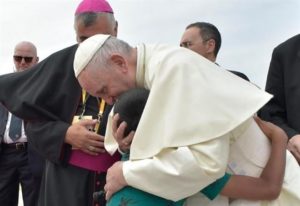 It is always helpful to remember that “in salvation history, the Lord saved one people. We are never completely ourselves unless we belong to a people. That is why no one is saved alone, as an isolated individual. Rather, God draws us to himself, taking into account the complex fabric of interpersonal relationships present in the human community. God wanted to enter into the life and history of a people” (Gaudete et Exsultate, 6). Consequently, the only way that we have to respond to this evil that has darkened so many lives is to experience it as a task regarding all of us as the People of God. This awareness of being part of a people and a shared history will enable us to acknowledge our past sins and mistakes with a penitential openness that can allow us to be renewed from within. Without the active participation of all the Church’s members, everything being done to uproot the culture of abuse in our communities will not be successful in generating the necessary dynamics for sound and realistic change. The penitential dimension of fasting and prayer will help us as God’s People to come before the Lord and our wounded brothers and sisters as sinners imploring forgiveness and the grace of shame and conversion. In this way, we will come up with actions that can generate resources attuned to the Gospel. For “whenever we make the effort to return to the source and to recover the original freshness of the Gospel, new avenues arise, new paths of creativity open up, with different forms of expression, more eloquent signs and words with new meaning for today’s world” (Evangelii Gaudium, 11).
It is always helpful to remember that “in salvation history, the Lord saved one people. We are never completely ourselves unless we belong to a people. That is why no one is saved alone, as an isolated individual. Rather, God draws us to himself, taking into account the complex fabric of interpersonal relationships present in the human community. God wanted to enter into the life and history of a people” (Gaudete et Exsultate, 6). Consequently, the only way that we have to respond to this evil that has darkened so many lives is to experience it as a task regarding all of us as the People of God. This awareness of being part of a people and a shared history will enable us to acknowledge our past sins and mistakes with a penitential openness that can allow us to be renewed from within. Without the active participation of all the Church’s members, everything being done to uproot the culture of abuse in our communities will not be successful in generating the necessary dynamics for sound and realistic change. The penitential dimension of fasting and prayer will help us as God’s People to come before the Lord and our wounded brothers and sisters as sinners imploring forgiveness and the grace of shame and conversion. In this way, we will come up with actions that can generate resources attuned to the Gospel. For “whenever we make the effort to return to the source and to recover the original freshness of the Gospel, new avenues arise, new paths of creativity open up, with different forms of expression, more eloquent signs and words with new meaning for today’s world” (Evangelii Gaudium, 11).
It is essential that we, as a Church, be able to acknowledge and condemn, with sorrow and shame, the atrocities perpetrated by consecrated persons, clerics, and all those entrusted with the mission of watching over and caring for those most vulnerable. Let us beg forgiveness for our own sins and the sins of others. An awareness of sin helps us to acknowledge the errors, the crimes and the wounds caused in the past and allows us, in the present, to be more open and committed along a journey of renewed conversion.
Likewise, penance and prayer will help us to open our eyes and our hearts to other people’s sufferings and to overcome the thirst for power and possessions that are so often the root of those evils. May fasting and prayer open our ears to the hushed pain felt by children, young people and the disabled. A fasting that can make us hunger and thirst for justice and impel us to walk in the truth, supporting all the judicial measures that may be necessary. A fasting that shakes us up and leads us to be committed in truth and charity with all men and women of good will, and with society in general, to combatting all forms of the abuse of power, sexual abuse and the abuse of conscience.
In this way, we can show clearly our calling to be “a sign and instrument of communion with God and of the unity of the entire human race” (Lumen Gentium, 1).
“If one member suffers, all suffer together with it”, said Saint Paul. By an attitude of prayer and penance, we will become attuned as individuals and as a community to this exhortation, so that we may grow in the gift of compassion, in justice, prevention and reparation. Mary chose to stand at the foot of her Son’s cross. She did so unhesitatingly, standing firmly by Jesus’ side. In this way, she reveals the way she lived her entire life. When we experience the desolation caused by these ecclesial wounds, we will do well, with Mary, “to insist more upon prayer”, seeking to grow all the more in love and fidelity to the Church (SAINT IGNATIUS OF LOYOLA, Spiritual Exercises, 319). She, the first of the disciples, teaches all of us as disciples how we are to halt before the sufferings of the innocent, without excuses or cowardice. To look to Mary is to discover the model of a true follower of Christ.
May the Holy Spirit grant us the grace of conversion and the interior anointing needed to express before these crimes of abuse our compunction and our resolve courageously to combat them.
Vatican City, 20 August 2018
THE COMMUNITY IN CHILE
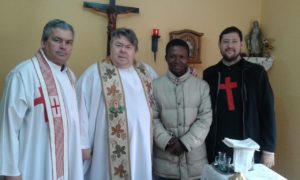 Message of the Superior General on the occasion of the pastoral visit to the Camillian community in Chile (the Province of Rome) (Santiago, 8-12 August 2018)
Message of the Superior General on the occasion of the pastoral visit to the Camillian community in Chile (the Province of Rome) (Santiago, 8-12 August 2018)
ROME – CADIS
THE CRITICAL HUMANITARIAN SITUATION IN ASIA MENACES THE FUTURE OF MILLIONS OF POOR AND SUFFERING SURVIVORS
An Appeal for Support to our Relief Efforts
In less than two months beginning in July, four big disasters brought about by monsoon rains, typhoons, floods, inundations, and earthquake took place in Laos, India, Indonesia, and the Philippines. More than five million people are being affected by these disasters where the majority of them are the most vulnerable populace whose meager resources plunged them into catastrophic poverty. This critical humanitarian situation looms the future of these people who have been suffering already way before these “natural disasters” took place.
In July, accumulative rain has knocked down the biggest dam in Laos which affected 13.100 individuals, and hundreds are still missing. We could imagine how many farms were destroyed wherein almost 100% depends for their living. The same disaster happened in the Philippines particularly in the capital and nearby provinces which affected 1.279.943 individuals. The Camillians in the Philippine province both in Manila and Indonesia are now mobilizing to deliver immediate relief response.
In August, the ever-strongest monsoon in India has inundated the State of Kerala. Over 350 recorded deaths and more than 725.000 individuals are evacuated in the camps. Kerala is the State where most of our religious and ministries are located. The Camillian Task Force of India is mobilizing relief and medical camps. In the same month, three earthquakes took place in Lombok, Indonesia which scored 460 deaths and still hundreds are missing. It affected 3.512.689 individuals who are mostly farmers and fishermen. Our Camillian religious in Flores island despite the lack of personnel and religious are mobilizing to deliver relief to those survivors in collaboration with CADIS Australia.
 Camillian emergency relief mission to LombokYesterday, (Saturday – August 25, 2018), I arrived in Lombok. The first thing I did was to organize a local quick reaction team (QRT) who will work with us in our relief operation. The team consists of two permanent personnel who will assist us in our daily relief work, administration of goods and services, comprehensive assessment of needs, and coordination with the affected local communities. They are assisted by some volunteers who encouraged to help. The QRT will maintain our coordination from afar since the Camillians are residing in Maumere over a thousand kilometers distance.
Camillian emergency relief mission to LombokYesterday, (Saturday – August 25, 2018), I arrived in Lombok. The first thing I did was to organize a local quick reaction team (QRT) who will work with us in our relief operation. The team consists of two permanent personnel who will assist us in our daily relief work, administration of goods and services, comprehensive assessment of needs, and coordination with the affected local communities. They are assisted by some volunteers who encouraged to help. The QRT will maintain our coordination from afar since the Camillians are residing in Maumere over a thousand kilometers distance.THE COMMUNITY IN MADAGASCAR
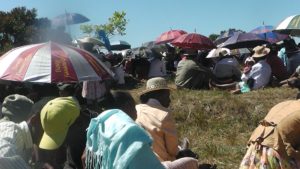 PILGRIMAGE OF THE SALESIAN FAMILY OF FIANARANTSOA (MADAGASCAR)
PILGRIMAGE OF THE SALESIAN FAMILY OF FIANARANTSOA (MADAGASCAR)
To commemorate the one hundred and fiftieth anniversary of the building of the Basilica di Santa Maria Ausiliatrice di Valdocco, in Turin, the great Salesian family planned its celebration of this anniversary in various places of mission. In Fianarantsoa the jubilee pilgrimage organised by the Daughters of Mary the Helper brought together the various members of the great Salesian family with very many other faithful in Ilena, a Marian setting about seven kilometres from the city, on the day of the falling asleep of the Blessed Virgin Mary.
The programme of the day envisaged the showing of a video on the above-mentioned basilica and this took place in the multi-purpose hall of the village, which, however, turned out to be too small: many people had to settle for listening to comments on it thanks to the loudspeakers that had been placed outside.
Afterwards the pilgrims gathered in front of the Chiesa Santa Teresina to begin the via crucis with the Blessed Virgin Mary. After reaching the top of the hill at the tower of the Blessed Virgin Mary, Salus Infirmorum, some said the rosary listening during pauses to some phrases of St. John Bosco, and others drew near to the sacrament of confession, with the presence of five priests.
Lunch was a propitious moment for the pilgrims to introduce themselves to each other. The chaplain gave a brief account of the transformation of the place from being a traditional sacrificial altar to being a place of devotion to the Blessed Virgin Mary, Salus Infirmorum.
In the afternoon the Eucharist was celebrated, at the end of which the pilgrims, and in particular pupils who were going to take their state exams, received a special blessing.
THE PROVINCE OF NORTH ITALY
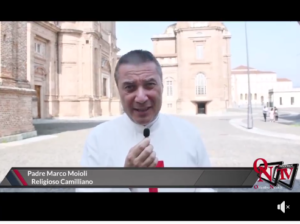 On the occasion of the Synod of Bishops of 2018 whose title will be ‘Young People, Faith and Vocational Discernment’, the section on pastoral care for the vocations of young people of the Camillians of the Province of North Italy took part in the extraordinary veneration of the Turin Shroud together with a group of young volunteers who by a thousand routes came to Reggia di Venaria Reale for a prayer vigil during the night of 9 August 2018. On 10 August, in Valdocco, they went to the house of Don Bosco, before going to venerate the Turin Shroud throughout the night. How beautiful it was to discover that we are loved by the Lord and to understand that His Love leaves its mark!
On the occasion of the Synod of Bishops of 2018 whose title will be ‘Young People, Faith and Vocational Discernment’, the section on pastoral care for the vocations of young people of the Camillians of the Province of North Italy took part in the extraordinary veneration of the Turin Shroud together with a group of young volunteers who by a thousand routes came to Reggia di Venaria Reale for a prayer vigil during the night of 9 August 2018. On 10 August, in Valdocco, they went to the house of Don Bosco, before going to venerate the Turin Shroud throughout the night. How beautiful it was to discover that we are loved by the Lord and to understand that His Love leaves its mark!
THE PROVINCE OF ROME
ROME – the Church of St. Mary Magdalene
 In the heart of Rome…the heart of Camillus encounters young people
In the heart of Rome…the heart of Camillus encounters young people
On Saturday 11 August 2018 a hundred young people of the neo-catechumenal movement of Umbria, and other young people from a number of Italian dioceses, came together at the Church of St. Mary Magdalene to learn more about St. Camillus and his message before the afternoon meeting with Pope Francis. Journeying towards the Synod of Bishops of 2018 learning about the perennial ‘youth of Saints’!
DELEGAZIONE IN KENYA
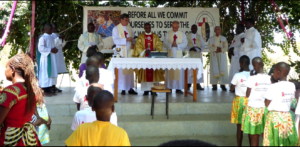 I Camilliani a Karungu (Kenya) da 25 anni
I Camilliani a Karungu (Kenya) da 25 anni
La festa di San Camillo De Lellis è stata celebrata domenica 15 luglio 2018 al St. Camillus Mission Hospital – Karungu (Kenya). La stessa occasione ha segnato la conclusione della commemorazione del 25° anniversario della presenza dei religiosi camilliani a Karungu (1993 – 2018). L’occasione ha anche offerto l’opportunità di accogliere sette novizi nella comunità stessa di Karungu.
Erano presenti alla celebrazione, insieme a diversi membri della Famiglia Camilliana Laica, p. Dominic Mwanzia, delegato provinciale dei camilliani in Kenya, p. Emilio Balliana, direttore della missione a Karungu, fr. Bonaventure Muswi, p. Paolo Guarise – maestro dei novizi – p. John Kariuki, p. Reuben Njagi della comunità camilliana di Tabaka-Kisii, fr. Domenico Misaro e fr. Evans Juma.
I religiosi passionisti, nostri ‘vicini di casa’ a Karungu, erano ben rappresentati da p. Claudio Moscatelli e da fr. Maurice Omollo. Erano presenti anche le religiose della Beata Vergine di Kiranda, guidate dalla Superiora, suor Agnese Kwamboka e da suor Lucia delle religiose Sacramentine di Rongo.
Erano presenti i collaboratori del St. Camillus Mission Hospital e del Dala Kiye. Sono stati invitati tutti i bambini accolti dal Dala Kiye, i bambini del complesso educativo Beato L. Tezza e i loro insegnanti.
La celebrazione è iniziata con la Santa Messa presieduta da p. Dominic Mwanzia. Il coro era composto dagli studenti della scuola secondaria Beato L. Tezza, con alcuni laici camilliani. Nel suo sermone, p. Dominic ha esortato i camilliani a sostenere il servizio reso a Karungu secondo l’esempio di San Camillo De Lellis. Ha inoltre sottolineato la dedizione al servizio di tutti e ha chiesto la collaborazione di tutte le persone interessate.
Dopo la celebrazione della Santa Messa, ci sono stati i discorsi celebrativi di alcune persone che erano presenti e hanno svolto ruoli importanti per il St. Camillus Mission Hospital in questi ultimi 25 anni. P. Claudio, passionista, ha avuto un ruolo chiave nel portare i camilliani da Tabaka e nel convincerli a iniziare una missione a Karungu. Nel suo discorso, p. Claudio ha raccontato come ha portato p. Emilio Balliana e fr. Valentino Gastaldello a Karungu. I due furono inizialmente ospitati nella Parrocchia di Kiranda, dove Suor Agnese li ha accolti e sostenuti. Fr. Claudio ringrazia i Camilliani per aver ascoltato la sua chiamata e per il loro servizio nell’aiutare la gente di Karungu.
THE DELEGATION IN COLOMBIA
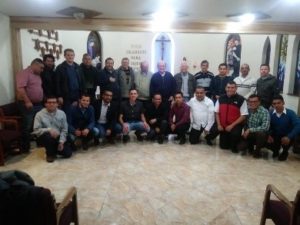 A week of ongoing formation for the Camillian religious of South America (at the community of Bogota-Colombia). Fr. Angelo Brusco led and coordinated the debate and the dialogue.
A week of ongoing formation for the Camillian religious of South America (at the community of Bogota-Colombia). Fr. Angelo Brusco led and coordinated the debate and the dialogue.
THE DELEGATION IN VIETNAM – priestly ordinations
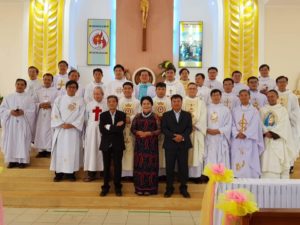 Two Vietnamese Camillian religious were ordained priests on 18 August 2018.
Two Vietnamese Camillian religious were ordained priests on 18 August 2018.
The solemn celebration was presided over by Msgr. Peter Nguyen Van Kham, the bishop of the diocese of Mỹ Tho. About 1,500 people took part.
The two confreres who were consecrated presbyters were Peter Pham Kim Quyen and Vincent Vu Quoc Toan.
In his homily the bishop went straight to the point without mincing words: a priest must live in such as way as to become ‘alter Christus’ (another Christ): only with this style of life would the people who meet him not call him ‘a doctor who is a priest’ or ‘a nurse who is a priest’ but a ‘priest who is a doctor’ or a ‘priest who is a nurse’: beyond any title, a priest must be his principal character.
With a great deal of frankness, the bishop mentioned the current problems and suffering of the Church caused by many scandals for which priests were responsible. Therefore, every priest must engage in a serious pause to examine himself anew, to strengthen, to protect and to cultivate his character as a priest. He needs to remain deeply immersed in prayer life, despite his demanding ministry with the ‘people of God’. It is the experience of prayer that nourishes and expands the experience of service.
THE DELEGATION IN TAIWAN
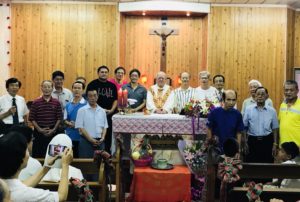 In Taiwan on 8 August father’s day was celebrated because in Chinese the word ‘eight’ when spoken has the same meaning as ‘daddy’.
In Taiwan on 8 August father’s day was celebrated because in Chinese the word ‘eight’ when spoken has the same meaning as ‘daddy’.
The sixtieth anniversary of the Camillian parish church of Lotung, which is dedicated to the Blessed Virgin Mary of the Assumption, was celebrated on 12 August. The Archbishop of Taipei and the chargé d’affaires of the apostolic nunciature were present. During the Holy Mass the baptism, confirmations and first communions of ten new faithful were celebrated.
In Taiwan on 13 August the ceremony to commemorate people’s ancestors took place. The Church, in order to draw near to local customs, organised a ceremony of prayer for people’s ancestors and given that according to Chinese tradition the seventh lunar month is the month of bad spirits, advantage was taken of this to bless all the rooms for patients and the offices of our hospital with holy water.
The Camillians in Lotung to ‘heal and evangelise’
 Lotung (Agenzia Fides). In 1952, when the Camillians who worked in China since 1946 were expelled, one group of them decided to go to Thailand and one decided to go to Taiwan. In China they had already adopted the following motto to mark out their work: ‘Health and Evangelise’. After moving to China they wanted to keep it as a programme for their apostolate.
Lotung (Agenzia Fides). In 1952, when the Camillians who worked in China since 1946 were expelled, one group of them decided to go to Thailand and one decided to go to Taiwan. In China they had already adopted the following motto to mark out their work: ‘Health and Evangelise’. After moving to China they wanted to keep it as a programme for their apostolate.
They thus began to ‘heal’ in a small hospital with twelve beds and at the same time they dedicated themselves ‘to evangelising’ in the district that had been entrusted to them by the Archbishop. As related to Agenzia Fides by Fr. Giuseppe Didone, the Provincial Superior of the Camillians in Taiwan, in addition being responsible for a little church at the side of the hospital the Camillians began their evangelisation of the native peoples. Given that they were poor, when they came to hospital they were treated almost free of charge. One day an elderly woman came back to the church and asked a missionary: “come and speak to us about your God who is so good”.
At Lotung, as well, evangelisation began early and for this purpose a house with two floors was rented. Given that the number of Christians was increasing quickly, this place was soon not adequate and therefore a large church was planned. The construction work began on 26 December 1957. The Provincial Superior of that time followed the building works: Fr. Aldo Antonelli, a priest, medical doctor and engineer who conceived of the project and carried it through. The church, which was inaugurated on 25 September 1958, and therefore sixty years ago, is in the gothic style and the stained-glass windows make it an artistic masterpiece and to such an extent that it has been recognised by the government as being a national artistic monument. Dedicated to the Blessed Virgin Mary of the Assumption, it has some elements in an oriental style, such as the incense holder and the altar for ancestors, in order to be in harmony with Chinese culture.
On 12 August, in order to celebrate the sixtieth anniversary of the consecration of the church and on the eve of the liturgical solemnity of the Assumption of Mary, great celebrations took place presided over by the Archbishop of Taipei, Msgr. John Hung, with the administration of the sacraments of baptism and confirmation. In addition, painting competitions and other activities connected with the anniversary were organised.
THE PROVINCE of BURKINA FASO
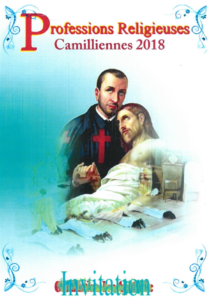 PERPETUAL PROFESSIONS – TEMPORARY PROFESSIONS AND ANNIVERSARIES IN BURKINA FASO (8 September 2018)
PERPETUAL PROFESSIONS – TEMPORARY PROFESSIONS AND ANNIVERSARIES IN BURKINA FASO (8 September 2018)
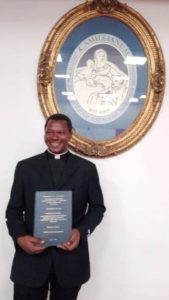 On 30 July 2018, Fr. Lazare Yelyaore, a Camillian religious of the Province of Burkina Faso, defended his doctoral thesis at the ‘Camillianum’ of Rome. His thesis was entitled: ‘Santé et développemnet. Perspectives theologico-pastorales pour le Burkina Faso a la lumière de l’enseignement social de Jean-Paul II et de Benoît XVI’.
On 30 July 2018, Fr. Lazare Yelyaore, a Camillian religious of the Province of Burkina Faso, defended his doctoral thesis at the ‘Camillianum’ of Rome. His thesis was entitled: ‘Santé et développemnet. Perspectives theologico-pastorales pour le Burkina Faso a la lumière de l’enseignement social de Jean-Paul II et de Benoît XVI’.
THE PROVINCE of THAILAND
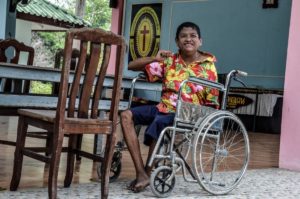 Thailand: amongst the damned infected with HIV, between superstition and prevention.
Thailand: amongst the damned infected with HIV, between superstition and prevention.
(From Rayong, Thailandi) – Father Giovanni Contarin of the Order of Camillians, who at the present time runs a home for elderly people in Korat in the north of Thailand, in 1996 opened in Rayong the first centre for people with HIV-AIDS in the country. Some time previously he had tried to do this near to Bangkok but the experience finished in the worst of ways. Initially threats, then the explosion of a bomb right in front of the building. The aim was to intimidate: “you are not welcome here”. The reasons were rooted in Thai culture which in large measure saw the virus as a sort of punishment inflicted on an individual for his or her dissolute conduct in his or her previous life. For this reason, HIV-positive people were often abandoned and rejected by the healthy part of the population. But this Italian missionary had determination. He did not give up and decided to open the centre two hundred kilometres to the south, in an area with a high percentage of people infected with HIV, classified amongst the first five with the disease of Thailand.
“They accompanied them to death with sensitivity”
Until a few years ago in Thailand there was no escape for people with HIV. To contract the HIV virus was the same as receiving a death sentence. The fate of these sick people, men, women and children, was sealed. To die was the only epilogue possible. And Giovanni Contarin could do nothing else but accompany these suffering people until their last breath. The beginning of his activity at their side, in fact, involved making their deaths dignified ones, holding each one of them by the hand, with compassion and sensitivity. He did this for ten long years. “At that time it was almost impossible to obtain anti-retroviral treatment”, Father Chaisak Thaisonthi, the current Director of the Camillian Social Center, explained to me. “Treatment existed, but it was too expensive”. Fortunately, today the situation has changed a great deal. “Since 2006’, this religious went on, “the Thai government has assured the provision of medical products free of charge. In this way all patients who are HIV-positive have an opportunity to be treated and improve their quality of life”. As a consequence, the purpose of the centre has changed: “Now we help the patients to regain their strength and go back into society”.
The naturalness and the innocence of the little ones
This centre of the Camillians , which since 1996 up to the present time has helped almost two thousand individuals, amongst whom 200 minors, now has 75 adults and 4 children. “All those inside it have HIV-AIDS and have been abandoned or become orphans”, I am told by Marco Palestrini, an Italian volunteer who, since coming to Thailand fifteen years ago, has dealt with fund raising. “Before the opening of this centre, these sick people did not even have a place to live. Here, instead, they have a safe home, food and above all else an opportunity to improve their state of health and then carry on with their lives in society”. Marco accompanies me outside the building where the smallest children play. The children look at me full of curiosity. Their naturalness and their innocence leave me speechless. Until I become more aware of where I am, a place of pain and illness. Then, however, walking forward a few dozen steps I come to the part of the centre which has the most difficult cases, such as people who have gone blind or have grave disabilities at the level of movement.
THE PROVINCE OF SICILY AND NAPLES – the inter-parish mission in Acireale on the occasion of the feast day of St. Camillus.
On 15 July the Camillian inter-parish mission in Acireale on the occasion of the celebrations in honour of St Camillus, and the one hundred and fiftieth anniversary of the birth of the Blessed Domenica Brun Barbantini, came to end.
This mission, which witnessed the involvement of the whole of the Camillian family, began on Sunday 8 July with a solemn celebration of the Eucharist presided over by His Eminence Cardinal Paolo Romeo, during which the mandate was entrusted to the missionaries with the handing over of the red cross of St. Camillus.
For a week a numerous group made up of priests, men and women religious and lay faithful reached out to the sick and the poor of Acireale, trying to bring them relief in their suffering.
The sick were able to encounter Christ in their own personal suffering, directly receiving in their homes the sacraments of healing, with the possibility of having their confessions heard and receiving the anointing of the sick and the holy Eucharist.
In addition, the mission enabled sick people who have been forced to stay in their homes for a long time to take part in the celebration of the Eucharist in their own homes where they were offered the possibility of taking part in the mystery of the Body and the Blood of Christ, in its communal dimension as well, thanks to the participation of family relatives and friends.
But this week of Camillian celebration and fraternity was also an important opportunity to be able to bring the good news to the streets of Acireale through evening catechesis and evangelisation in the street in Corso Umberto.
THE VICE-PROVINCE OF BENIN-TOGO
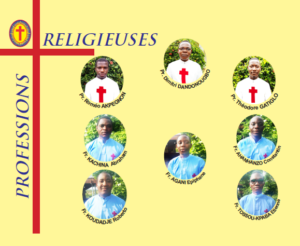 Perpetual professions– temporary professions in Benin-Togo (14 September 2018)
Perpetual professions– temporary professions in Benin-Togo (14 September 2018)
Letter of Fr. Guy-Gervais Ayite, Vice-Provincial Superior of Benin-Togo – programme of the celebrations for the move of the Vice-Province to the status of a Province (15 September 2018)
MEETINGS OF THE ORDER OF CAMILLIANS (2014 – 2020)
THE LAY CAMILLIAN FAMILY
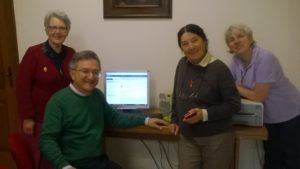 The international meeting of the LCF will be held on 13-20 October 2018 at Villa Primavera (Rome) of the Handmaidens of the Incarnation. This meeting will be opened by the presidents and principal spiritual assistants of the LCF: two people for each Province, Vice-Province and Delegation of the Order.
The international meeting of the LCF will be held on 13-20 October 2018 at Villa Primavera (Rome) of the Handmaidens of the Incarnation. This meeting will be opened by the presidents and principal spiritual assistants of the LCF: two people for each Province, Vice-Province and Delegation of the Order.
DIARY OF THE SUPERIOR GENERAL AND THE GENERAL CONSULTA
Fr. Leocir PESSINI, together with Fr. Laurent ZOUNGRANA, will take part in the celebrations for the canonical erection of the new Province of Benin-Togo (9-18 September 2018).
The Central Economic Commission of the Order will meet at the ‘Magdalene’ buildings in Rome on 6-8 September 2018.
DECISIONS OF THE GENERAL CONSULTA
The Superior General with the agreement of the members of the General Consulta:
- Has erected canonically the Camillian community of Pescara (Italy), dependent on the Camillian Province of Burkina-Faso.
PUBBLICAZIONI
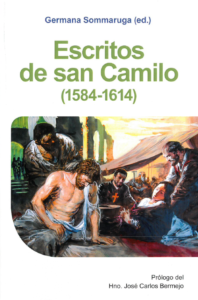 Escritos de San Camilo (1584-1614) – Germana Sommaruga
Escritos de San Camilo (1584-1614) – Germana Sommaruga
Nuova edizione in lingua spagnola
La figura de Camilo de Lelis es de una relevancia singular en la historia del a asistencia sanitaria, no solo en la vita de la Iglesia y para la Orden de los religiosos camilos por él fundada. Su aportación constituye una revolución en el modelo asistencial, en la cultura de la época en lo relacionado al sufrimiento visto desde la fe, asì como un referente muy especial para conocer la historia del mundo de la salud y de la asistencia sanitaria.
Contamos con varias biografías que permiten hacerse ideas complementarias de Camilo de Lelis. Es muy especial la Vida manuscrita, de su compañero Sanzio Cicatelli, y es muy entrañable la de Alessandro Pronzato Todo corazón para los enfermos, desde estilos diferentes.
Para acceder a los escritos del proprio camilo de Lelis, que es lo que nos permite este libro, nos ayuda Germana Sommaruga, fundadora del Instituto Secular Cristo Esperanza. Una mujer pequeña, de corazón grande, reflexiva y tímida, pero escrutadora de las fuentes y buscadora de inspiración. Ella nos sitúa cada texto aquí recogido con su comentario breve, libre, que sirve mucho de ayuda para la comprensión del contenido y el contexto de este material tan importante para acceder directamente al pensar y sentir de Camilo de Lelis, un santo que estaba dotado de una extraordinaria sensibilidad humana, «como una madre», y de una infinita caridad y entrega al enfermo.
PRAYER FOR THE VICTIMS OF ALL TYPES OF DISASTERS
 For all the victims of all types of disasters, for people who have lost their lives, for their loved ones, for the survivors, and for all those who work to provide help, we pray:
For all the victims of all types of disasters, for people who have lost their lives, for their loved ones, for the survivors, and for all those who work to provide help, we pray:
God in heaven, who has created and who preserves every existence,
You know all of our sadness and our suffering. May all the victims of all types of disasters be welcomed in your peace! Receive, we pray, in your mercy, our very many brothers and sisters buried by the forces unleashed by nature. Lead them to your home!
Comfort the pain of so many families, dry the tears of so many brothers and sisters, offer protection to the loneliness of so many orphans. Instill courage into everyone so that pain is transformed into a journey of growth and hope.
Generate in the hearts of Christians and all men and women of good will the wish to act so that the wounded and those who suffer because of these calamities experience the comfort of fraternal solidarity.
You who live and reign for ever and ever.
Amen.
Our Father – Hail Mary – Glory



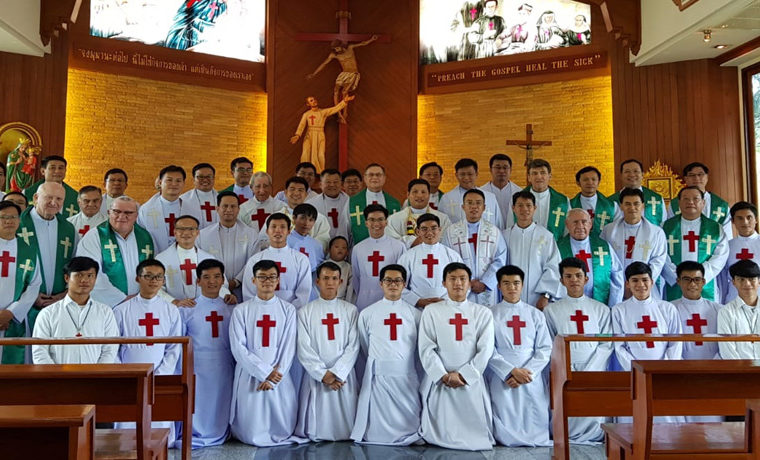

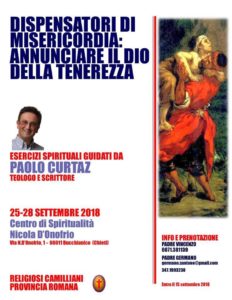
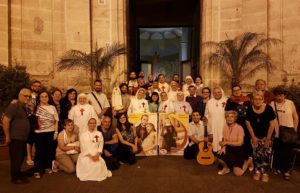

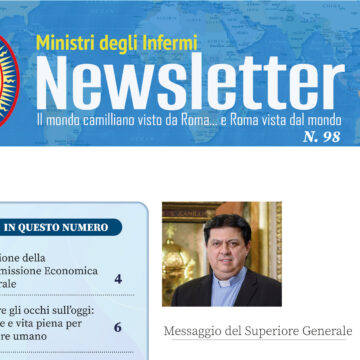
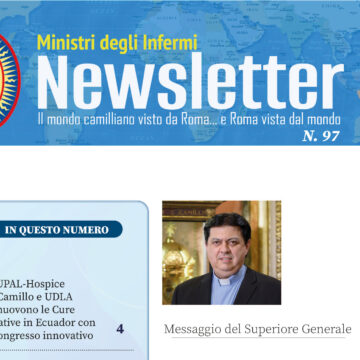
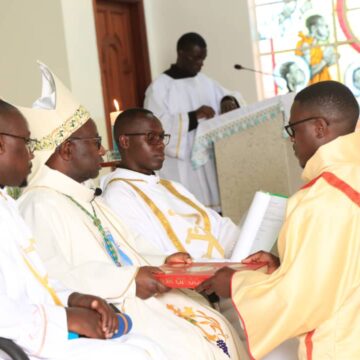
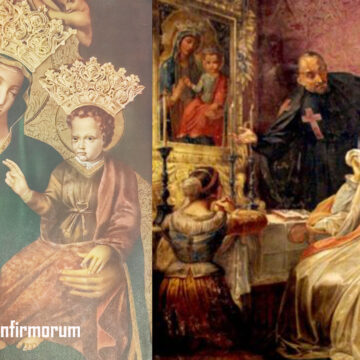

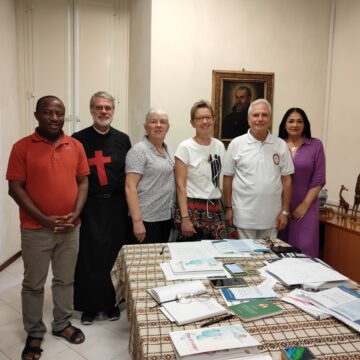

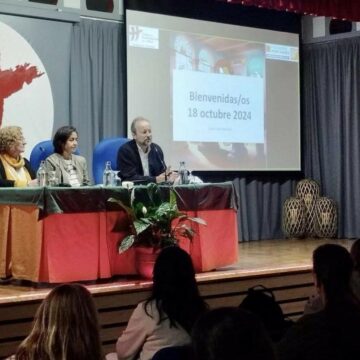
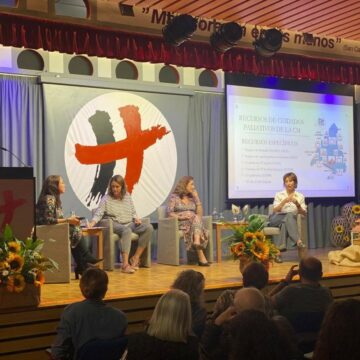
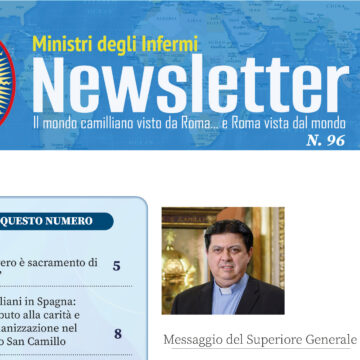
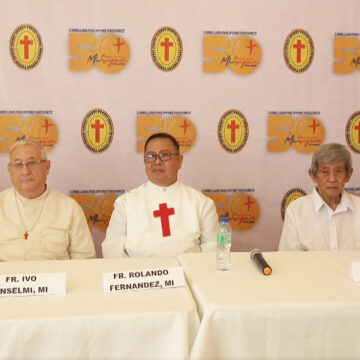
Camillians on Facebook
Camillians on Twitter
Camillians on Instagram